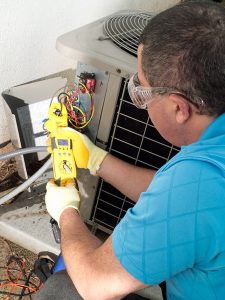 An air conditioning system is manufactured to use a specific amount of chemical refrigerant. This is known as an air conditioner’s charge. People often make the mistake of thinking refrigerant is an energy source for an air conditioner. It isn’t. The energy source of an air conditioner is electricity. Refrigerant is the heat transference medium that allows the air conditioner to move thermal energy outside of the house (cooling the indoor air) and exhausting it. The refrigerant evaporates and condenses in a cycle and never dissipates—so it will never get “used up.”
An air conditioning system is manufactured to use a specific amount of chemical refrigerant. This is known as an air conditioner’s charge. People often make the mistake of thinking refrigerant is an energy source for an air conditioner. It isn’t. The energy source of an air conditioner is electricity. Refrigerant is the heat transference medium that allows the air conditioner to move thermal energy outside of the house (cooling the indoor air) and exhausting it. The refrigerant evaporates and condenses in a cycle and never dissipates—so it will never get “used up.”
That doesn’t mean it can’t have a low charge, however! An amateur may have put the wrong charge in the AC when it was installed. The refrigerant lines can also corrode and develop leaks. Whatever the cause of an undercharged air conditioner, it means a range of problems and eventually a broken down AC.
Pressure change
During maintenance for an air conditioner, technicians check refrigerant pressure. This is how they tell that the system has the correct charge. Loss of refrigerant means a pressure drop throughout the air conditioner, and this is one of the causes of the malfunctions that occur.
Poor humidity control
One early sign you may notice when an air conditioner is undercharged is a rise in indoor humidity. An air conditioner isn’t specifically built as a dehumidifier (although some units come with humidity controls), but it does draw moisture from the indoor air when it evaporates refrigerant. Less refrigerant means less moisture pulled from the indoor air.
Higher cooling costs
Because lower refrigerant makes it harder for the air conditioner to absorb thermal energy from the house, the whole system must run longer cooling cycles to reach the thermostat setting. This will show up as an increase in cooling costs on utility bills. The longer cycles also mean more pressure on the system, which can trigger more repair needs.
Frozen indoor coils
It sounds odd that less refrigerant creates ice on the coils, but this is often what happens. The cold refrigerant moving through the coils cannot draw in enough heat to warm it past freezing, so the remaining refrigerant will freeze the moisture along the coils. Once ice develops, it will continue to worsen.
Fried compressor
A dead compressor is the worst malfunction for an air conditioner. The compressor is costly to replace, and when one dies it usually means the entire AC must be replaced. Low refrigerant will eventually cause this catastrophic failure because the compressor isn’t supposed to run with a different charge. It will overheat and burn out.
You cannot repair an undercharged air conditioning system on your own. Only licensed people who work in residential air conditioning in Tampa, FL can handle this job. Not only do they need to find the leaks (if they’re the source of the low charge) and seal them, they must also put in the correct refrigerant charge. Doing this job requires special licensing to handle refrigerant. Don’t hesitate when you believe you have an undercharged air conditioner—call our technicians to fix the issue before you have a dead AC!
Call The A/C Guy of Tampa Bay Inc. when you need great air conditioning repairs. Serving our Tampa Bay family with integrity and honor.

